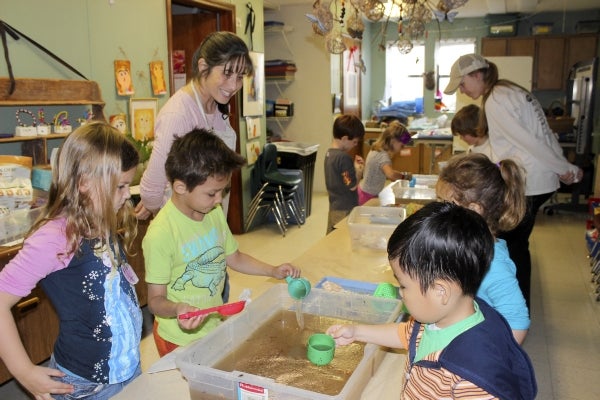Salisbury Academy students celebrate Earth Day
Published 12:00 am Thursday, April 23, 2015

- Kindergarten teacher Jan Ketner and her students use tools to clean tubs of water polluted with items such as glitter, mulch and oil. Submitted.
Salisbury Academy’s youngest students celebrated Earth Day early as part of the school’s strategic efforts in the areas of sustainability and environmental responsibility.
Earlier this year, Salisbury Academy announced Project Green Space, which aims to create a more sustainable and environmentally friendly school as well as conservation-minded citizens.
“As we begin this process; we are already feeling the green spirit across campus,” said Head of School Beverly Fowler. “Project Green Space is about sustainability within our facility as well as letting children engage with and experience the outdoors, teaching students to be good stewards of our natural resources.”
Last week, the junior kindergarten and kindergarten students participated in an early Earth Day Extravaganza filled with hands-on activities including composting, planting a garden, recycling activities, and water pollution and conservation education.
“We work hard to bring natural aspects to our classrooms and playground,” said kindergarten teacher Mariana Sanchez. “We believe children need to be exposed to nature, so that they learn to take care of it. This activity was the perfect opportunity to further our students’ understanding of sustainability. We want them to take ownership and be inspired to take care of the environment.”
Students used tools to clean tubs of water polluted with items such as glitter, mulch, and oil. “Students learned that once there is pollution in our water sources, it is nearly impossible to clean it,” said Sanchez.
Students planted flowers with junior kindergarten teacher Sandy Jordan, learning about what plants need to grow and how plants are important for our earth because they provide oxygen.
Parent volunteer Mary Corinne DeGood led the students in an activity where they made compost. In 20 minutes, the students created compost using the waste they had made. They were given a recipe and made layers of ingredients with their food scraps, soil, leaves, chicken manure and water. Then they brainstormed on what happens when it cooks and learned how to keep it cooking. “The process became a science experiment for them. They learned their food scraps could do something special,” she said.
The students will be responsible for turning their compost bottles daily for weeks to ensure that the materials break down properly and then will use this compost in the class garden. Two Pigs Farm donated materials for the composting project.
Sanchez led the students in a recycling relay. “The goal of the recycling relay was to teach the process of sorting recyclables,” she said. “In addition, we were able to see how much waste we produce. We also counted how many recyclables we had and measured how many people tall our recyclables were.”
“Providing an opportunity for experiential learning such as this deepens a young person’s understanding and appreciation for the process, as well as creates a foundation to transform themselves into environmental stewards,” DeGood said. “As these young students grow and gain new experiences, they will encounter various ways to be environmentally aware and responsible for their actions.”
As the school moves forward in this effort, Project Green Space will:
• Create educational programs that will foster conservation-minded students
• Partner with North Carolina State University’s College of Design on a collaborative project for future, nature-based outdoor enhancements to the school
• Implement a revolving green fund to finance on-campus investments in clean energy and resource reduction
• Seek certification through North Carolina Green Schools
• Form a school green team made up of faculty and staff, parents, board members, and community leaders
• Collaborate with Catawba College and the Center for the Environment on planning and strategy for future green projects.


